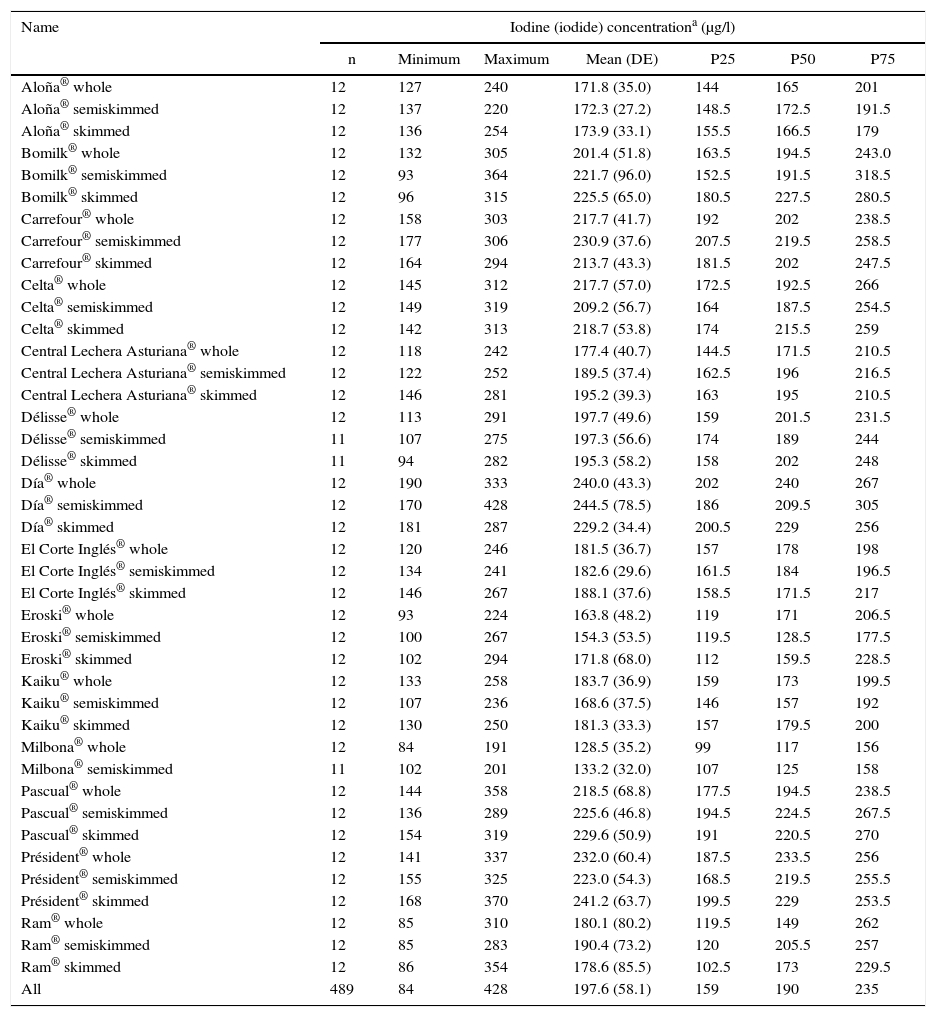Changes to dairy cow feeding have made milk a very important food source of iodine in several European countries and in USA. We aimed to measure the iodine content in ultra-high temperature (UHT) milk, the most widely consumed milk in Spain and in the south-west of Europe.
Material and methodsEvery month, throughout 2008, UHT milk samples of commercial brands available in Vitoria-Gasteiz (Basque Country, Spain) were collected and their iodine content was determined using high-performance liquid chromatography, according to official method 992.22 of the Association of Official Analytical Chemists International.
ResultsThe average (SD) iodide content and median (P25–P75) of standard UHT milk samples (n=489) were 197.6 (58.1) and 190 (159–235)μg/l, respectively. There were no significant differences between the iodide content in whole, semi-skimmed and skimmed milk (P=.219). The average iodide concentration and median in organic UHT milk (n=12) were 56.4 (8.6) and 55 (50.5–61.5)μg/l, figures that are much lower than those found in standard milk (P<.0001).
ConclusionsStandard UHT milk available in our food-retailing outlets constitutes a very important source of iodine. One glass of standard UHT milk (200–250mL) provides an average amount of 50μg of iodine. This amount represents around 50% of the iodine intake recommended during childhood or 20% of the iodine intake recommended for pregnant and lactating women.
Los cambios producidos en la alimentación de las vacas lecheras han convertido a la leche en una fuente alimentaria muy importante de yodo en varios países europeos y en EE. UU. El objetivo del trabajo es conocer el contenido de yodo de la leche de mayor consumo en España, la leche procesada mediante tratamiento térmico muy intenso (ultra-high temperature, [UHT, «ultrapasteurizada»]).
Material y métodosSe recogieron todos los meses durante el año 2008 muestras de leche UHT de marcas comerciales disponibles en Vitoria-Gasteiz, y se determinó su contenido de yodo mediante cromatografía líquida de alta resolución según el método oficial 992.22 de la Association of Official Analytical Chemists International.
ResultadosEl contenido medio (DE) de yoduro y la mediana (P25-P75) en las muestras de leche corriente UHT (n=489) fueron de 1976 (58,1) y 190 (159-235) μg/l, respectivamente. No hubo diferencias significativas entre el contenido de yoduro de la leche entera, la semidesnatada y la desnatada (p=0,219). La concentración media de yoduro y la mediana en la leche ecológica UHT (n=12) fueron 56,4 (8,6) y 55 (50,5-61,5) μg/l, cifras muy inferiores a las halladas en la leche corriente (p<0,0001).
ConclusionesLa leche corriente UHT disponible en nuestros comercios de alimentación constituye una fuente alimentaria muy importante de yodo. Un vaso de leche corriente UHT (200-250ml) proporciona una cantidad media de 50μg de yodo. Esta cantidad supone alrededor del 50% de la ingesta recomendada de yodo durante la infancia o el 20% de la recomendada para las mujeres gestantes y para las que amamantan a sus hijos.










